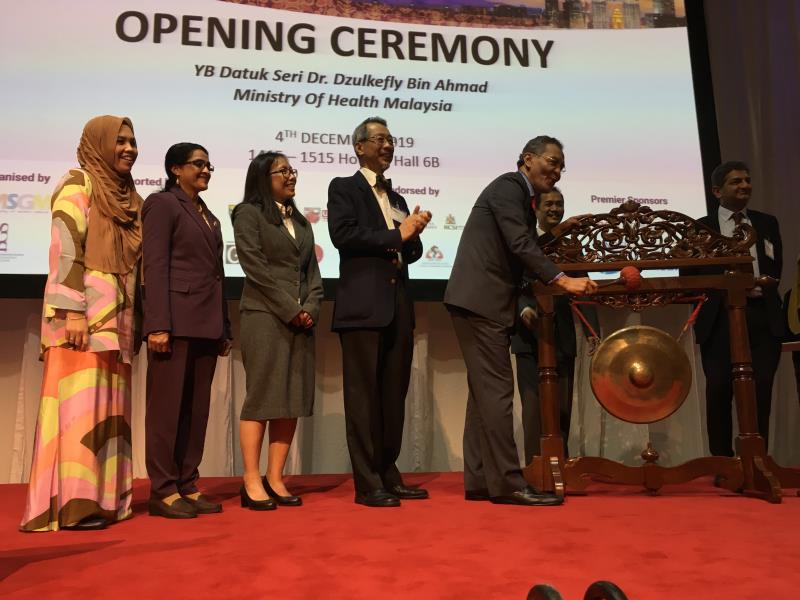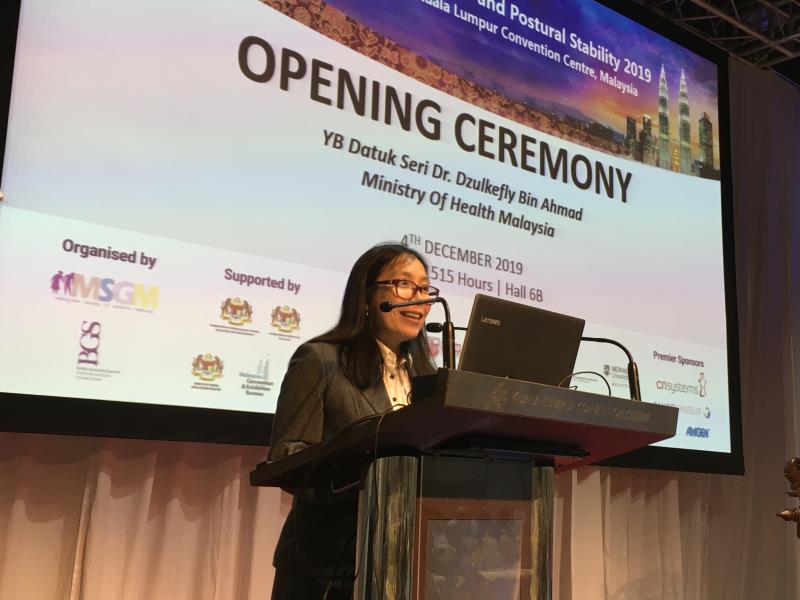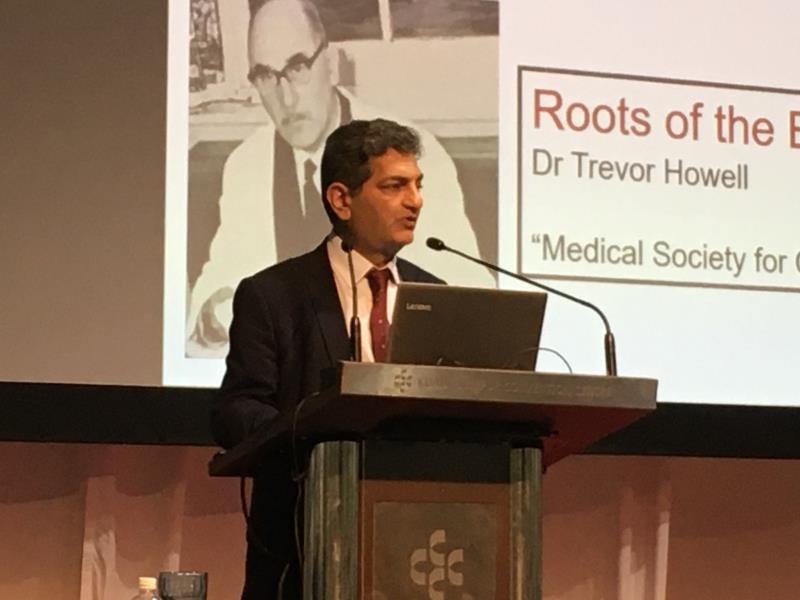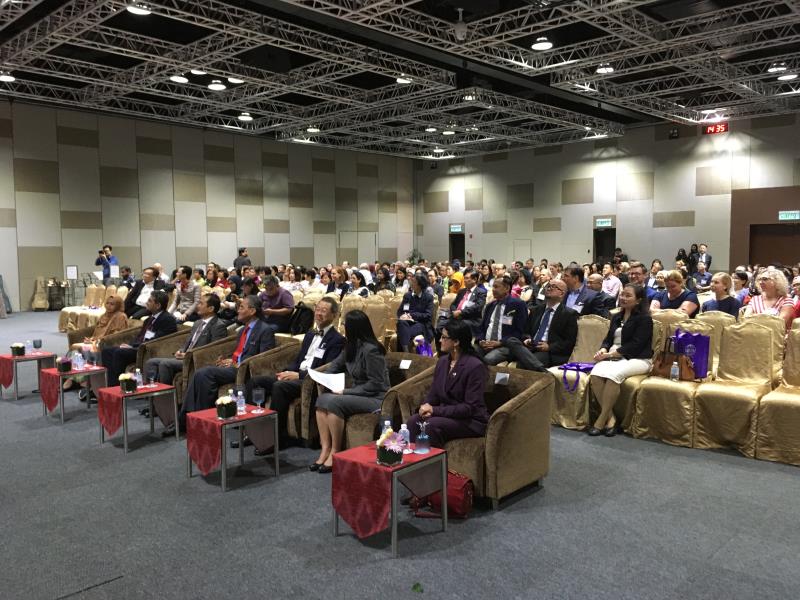 Professor Dr Tan Maw Pin, WCFPS organizing chairperson (third from left); Professor Dr Philip Poi, MSGM president (centre); Datuk Seri Dr Dzulkefly Ahmad, Minister of Health (3rd from right); and Professor Tahir Masud, BGS president (right) officiating the opening of WCFPS 2019.
Professor Dr Tan Maw Pin, WCFPS organizing chairperson (third from left); Professor Dr Philip Poi, MSGM president (centre); Datuk Seri Dr Dzulkefly Ahmad, Minister of Health (3rd from right); and Professor Tahir Masud, BGS president (right) officiating the opening of WCFPS 2019.December saw the first international congress tackling the issue of falls and postural stability take place in Kuala Lumpur, with over 200 organizations represented from 39 countries.
Co-hosted by the Malaysian Society of Geriatric Medicine (MSGM) and the British Geriatrics Society (BGS), the inaugural World Congress on Falls and Postural Stability (WCFPS 2019) saw nearly 450 delegates gathered for 4 days of knowledge sharing across multiple aspects of the issue, including physiology, orthopaedics, interior design, engineering, health economics, and social policy.
According to Professor Dr Tan Maw Pin, WCFPS 2019 organizing chairperson, the congress aimed to unite agencies from various countries to address the pressing issue of fall prevention in older adults.
“Older people who fall can suffer moderate-to-severe injuries such as bruises, hip fractures, and head trauma that can lead to other serious complications,” said Tan. “Falls can also result in a post-fall syndrome that includes dependence, confusion, loss of autonomy, immobilization, and even depression, leading to further restriction in their daily activities.”
Age is known to be a key risk factor for serious injury or death from falls. This may be in part due to physical, sensory, and cognitive changes associated with the ageing process, as well as physical environments which may not be adapted to the mobility needs of older adults.
In Malaysia, a 2018 National Health and Morbidity Survey report focused on elderly health found that 14.1 percent of adults aged 60 and older experienced a fall in the 12 months prior, with 27.5 percent experiencing two or more falls. Of these, 45.1 percent experienced minor injuries as a result, while 18.4 percent experienced severe injuries. Fifty-six percent of falls reportedly occurred in the home environment. [Available at iku.moh.gov.my/images/IKU/Document/REPORT/NHMS2018/NHMS2018ElderlyHealthVolume2.pdf]
 Professor Dr Tan Maw Pin
Professor Dr Tan Maw PinTan, who is also a professor of geriatric medicine at University Malaya, added that the idea for a world congress was initiated in September 2017 at the 18th International Conference on Falls and Postural Stability organized in Birmingham, UK, when the MSGM met with the BGS Falls and Bone Health Special Interest Group to discuss a possible collaboration for an international falls meeting in Kuala Lumpur.
“This event has not only brought together healthcare professionals and researchers in the area of falls and stability from around the globe; we have also included architects, engineers, and gerontechnology experts in the programme,” said Tan, adding that cooperation between professional sectors and the government would be necessary to comprehensively tackle fall prevention.
Supporting groups for WCFPS 2019 included government ministries such as the Ministry of Health; Ministry of Tourism, Arts and Culture; and the Ministry of Women, Family and Community Development. Public and private universities contributing included Monash University, Universiti Malaya, Universiti Kebangsaan Malaysia, Universiti Putra Malaysia, and Perdana University-Royal College of Surgeons in Ireland.
Local and international non-governmental organizations such as the Gerontological Association of Malaysia, the National Council of Senior Citizens Organizations Malaysia, the Malaysian Healthy Ageing Society, the Canadian Geriatrics Society, the Society for Geriatric Medicine Singapore, and the Australia and New Zealand Falls Prevention Society were also credited by Tan in their support of the congress.
At the opening ceremony of the congress, Professor Dr Philip Poi, MSGM president, noted that with international assistance, the field of geriatric medicine in Malaysia had come a long way from its inception by Dr Srinivas Pangal and himself in 1992.
“Despite the burgeoning demographic change happening here, we only grew to six geriatricians by 2004,” said Poi. “But we’ve had a lot of support from the UK, Australia, Singapore, and Hong Kong, which helped to kickstart the field at the 2006 Asia-Pacific Geriatric Conference … Since then, there’s been a surge in the field. We now have 40 local geriatricians and 26 trainees in 2019, which is a long way from where we were in 1992.”
Collaboration for an ageing world
 Professor Dr Tahir Masud
Professor Dr Tahir MasudSpeaking at the opening ceremony, Professor Tahir Masud, BGS president and secretary of the Clinical Section of the European Region of the International Association of Gerontology and Geriatrics (IAGG), drew attention to a 2015 report by the US Census Bureau that predicted 1 billion people in the world would be 65 years or older by 2030. [Available at: www.researchgate.net/publication/317400495]
“It’s good that people are living longer; in developed countries, the average life expectancy is reaching 80 years, and the developing world is catching up,” said Masud. “However, it’s not how old you live that’s important, but it’s the healthy life expectancy that’s important.”
He noted that in Western countries, life expectancy without disability is generally 17 to 22 years shorter than overall life expectancy. In Europe, an estimated 25 percent of people had two or more comorbid chronic health conditions once they reached their 50s; by 80 years of age, that proportion increased to almost 80 percent. [Lancet 2012;380(9836):37–43]
“One of the big issues is that of too many falls. Falls are the leading cause of accidental death and injury in people 65 years and older; 33 percent of older adults fall at least once a year,” said Masud.
 Participants of WCFPS 2019.
Participants of WCFPS 2019.Masud noted that other issues in geriatric health such as dementia, frailty, and polypharmacy were interlinked with the problem of falls, noting that fall frequency increased in people with cognitive impairments from dementia or adverse drug effects, while the severity of a fall’s impact was exacerbated by overall frailty in increasing age.
“We know because of multimorbidity, people are prescribed lots of medications, some of which are inappropriate, and adverse effects from some of them can lead to a prescribing cascade, which creates a negative feedback loop,” said Masud.
Masud highlighted the importance of the comprehensive geriatric assessment, defined as “a multi-dimensional, interdisciplinary diagnostic process to determine the medical, psychological and functional capabilities of a frail older person in order to develop a coordinated and integrated plan for treatment and follow up.” [J Am Geriatr Soc 1991;39(9 Pt 2):8S–16S]
He added that the concept of holistic treatment in geriatric medicine was not a new one, with guidelines for “the conservation of health by exercise and various diets” being advised in the treatment and prevention of sarcopenia in the elderly by Andalusian philosopher Ibn Rushd in the 12th century.